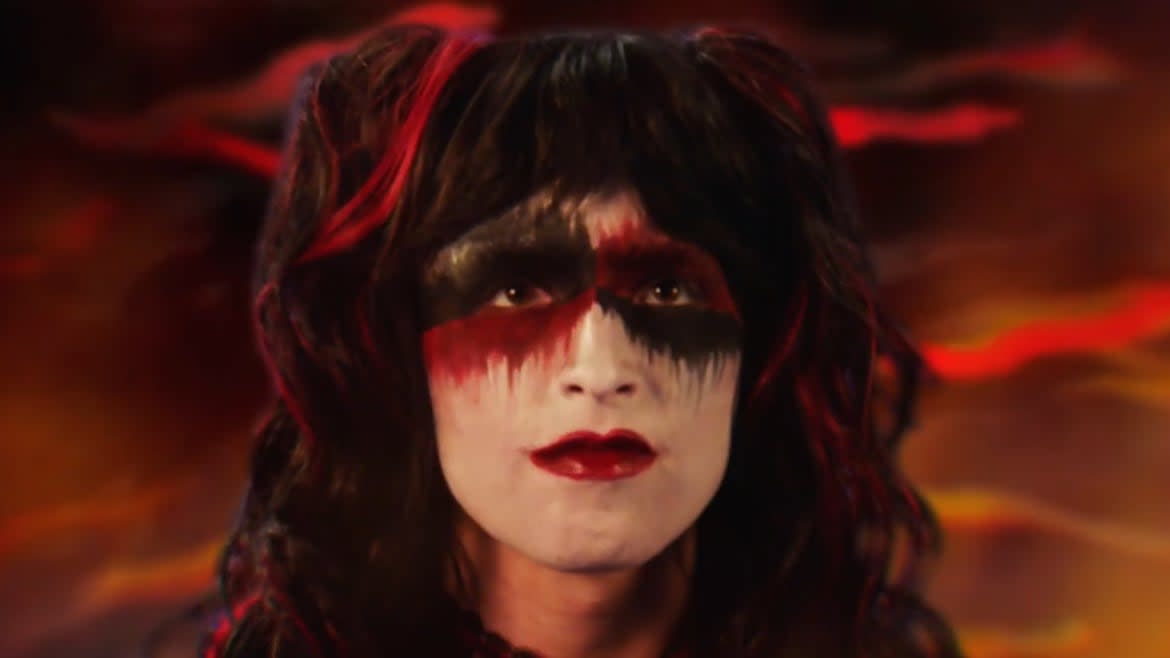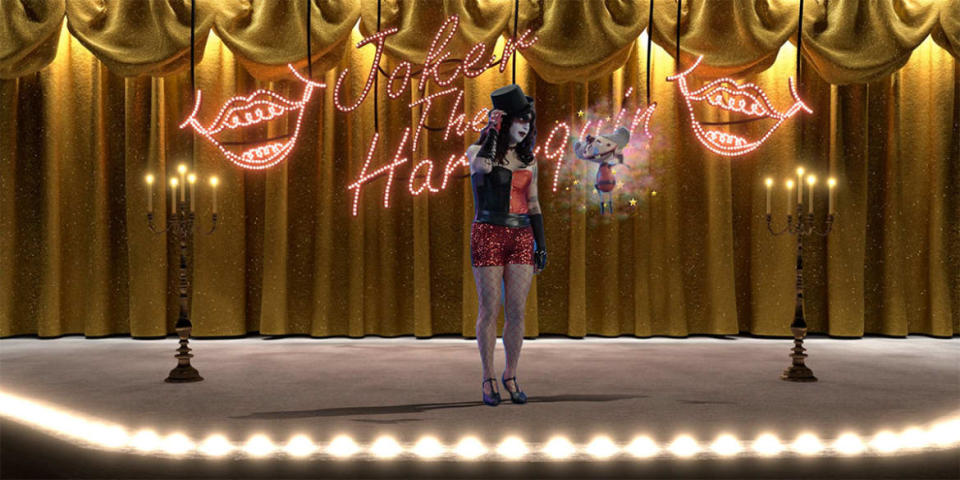Inside ‘The People’s Joker’: The Unauthorized Batman Movie Warner Bros. Doesn’t Want You to See

Update: Writer-director Vera sent The Daily Beast this statement regarding her film being removed from the TIFF lineup for to ‘rights issues’: “Everyone is going to get the chance to see this film. I don’t respond well to bullying or pressure from faceless institutions. It only emboldens me and what I was saying with this film. We’re looking for buyers and distribution partners who will protect us and make this film accessible to trans people and their families everywhere.”
One might assume that finding out your movie is premiering at a major film festival would be exciting news, but when Vera Drew first saw the announcement that her debut feature, The People’s Joker, would be premiering at the Toronto International Film Festival, the filmmaker actually became depressed for three days. Given that her film is an unauthorized parody that uses the likenesses of extremely popular DC characters, like the Joker and Harley Quinn, to tell a trans coming-of-age story, a cease-and-desist letter seemed inevitable.
For weeks, however, nothing came—even in the days ahead of The People’s Joker’s debut at the Toronto International Film Festival. Now, however, TIFF’s website states that Drew has withdrawn her film due to “rights issues.” Drew has stayed silent on Twitter but has retweeted posts indicating that the film received a cease-and-desist. A representative for the production declined to comment and directed The Daily Beast to TIFF’s statement.
While The People’s Joker is certainly “unauthorized”—no one at Warner Bros. Discovery or DC Comics signed off on Drew’s use of their characters—the film itself argues for its legality under Fair Use in a title card at its outset. Parody is protected under the First Amendment, so long as the new work significantly transforms its source material. Regardless of what might lie ahead for The People’s Joker, its distinction from the source material should be apparent to anyone from even one scene—or even the film’s teaser.
Warner’s decision to smack this (crowdfunded!) indie film down comes at a volatile moment for the company, which has endured multiple public scandals and a recent merger-induced bloodbath. People’s Joker defenders online have already begun rallying for the film to win TIFF’s People’s Choice Award in defiance of the apparent rights claim.
Speaking with The Daily Beast ahead of the film’s release (and before the film’s withdrawal) Drew said that, with this project, she wanted to take the idea that comic book stories are our modern mythology at its word.
“If these are our modern myths, and if the purpose of myth is to learn about the human experience and grow and also chart your progress—the hero's journey and all that stuff—let's actually do that earnestly with these characters,” the filmmaker said.
The People’s Joker follows a clown whose chosen name is Joker the Harlequin. Raised in Smallville by a repressive mother and numbed by a drug called Smylex—which does less to alter one’s mood than one’s facial expression—Joker eventually strikes out on her own to figure out who she really is. Eventually, she finds comedy—which, in this interpretation of Gotham City, has been outlawed unless you’re a cast member on a powerful show called “UCB Live.”
(In a surreal twist of irony, Saturday Night Live’’s Sarah Sherman voices a villainous animated Lorne Michaels—a gig she landed before she got cast on SNL.) In the end, Joker the Harlequin’s survival will rely on her ability to embrace her comedic voice—and, by extension, her experience.
I have no clue how today goes and my team wants me to say nothing of course so I’ll stay vague…but whatever happens in the next few hours, I want you to know…if you’ve been waiting and aching to watch our movie, ur going to get to soon. Stay tuned and stay with me. Need ur help pic.twitter.com/RcFIWYsUFi
— Vera Drew (@VeraDrew22) September 13, 2022
But the best trick in People’s Joker’s bag is its tone—reliably humorous, tart with sarcasm, and impressively focused when honing in on a satirical target. Even at its wildest and loudest, it’s never difficult to hear what this comedy wants to say.
Apart from being a lifelong Batman aficionado (as evidenced by some of the film’s more esoteric Batsy references) Drew likes to joke that she’s “the transgender Forrest Gump of alt-comedy.” She’s worked on series including Nathan for You, Comedy Bang! Bang!, and The Eric Andre Show, and frequently collaborated with sketch comedians Tim Heidecker and Eric Wareheim’s Abso Lutely Productions. In 2019, she received her first Emmy nomination for editing Sacha Baron Cohen’s political satire Who Is America?
The Emmy nomination also coincided with Drew’s decision to come out publicly as trans. Although the writer-director-editor had hoped her position in the industry would remain unchanged, years later she acknowledges that it wasn’t the case. “I was up for work that immediately went away when my pronouns changed,” Drew said. “I lost some very specific, kind of high-profile business relationships when that happened… It’s tough and it sucks, but at the same time, it kind of makes my life as an artist a lot easier.”
‘The People’s Joker’ Is a Trippy Movie That Turns the Joker Into a Trans Origin Story
These days, Drew finds it a lot simpler to discern who in the industry is worth her time and who is not. Still, she said, “I think the experience did Joker-fy me.”
The People’s Joker began brewing around the end of 2019. Bri LeRose, Drew’s friend and People’s Joker co-writer, had initially commissioned her to re-edit Todd Phillips’ Joker—a project that never came to fruition but planted the seeds for something bigger.
While working on the Phillips re-edit, Drew—a lifelong Batman fan—began to think about characters like Harley Quinn and Joker in the context of her own life, as well as a decade’s worth of experiences she was working to process at the time. “I don't know that I was necessarily gearing up to write my first feature or something, but I knew I needed to do some sort of big creative project around gender, comedy, and mom issues,” Drew said. “The Holy Trinity, as I call it.”
The framework for The People’s Joker seemed to materialize almost instantly—albeit a little hazily. “Joker” would be the central character’s chosen name; she would live in Gotham City and date “Mr. J,” a trans clown and comedian who, in spite of his “damaged” tendencies, would help Joker make sense of her identity at a time when she needed it. And to bring it all to life, Drew would re-edit “every single Batman movie” along with other films like Man on the Moon, Network, and Return to Oz into a personal coming-out story.

One of those ideas did change: Rather than create a found-footage film, Drew wound up crowdsourcing not only the budget for her production but also its artwork. More than 100 artists, most of whom Drew said are queer or trans, provide backdrops and character animation—a mixed-media approach that enhances the film’s homegrown feel and parodic ethos. (There’s hand-drawn animation, rotoscope, and a stop-motion sequence involving dolls.) The People’s Joker has already won over fans with its dry wit and its commentary on our IP-driven “modern myths,” but the off-the-wall, kaleidoscopic visuals are what will make it truly unforgettable.
“I wanted to spend way too much time on backgrounds that normally I would get noted to death on,” Drew said before adding with a laugh, “I wanted to break every single rule that I had been told by all of my bosses—many of whom are in this movie.”
Those bosses, whom Drew calls her “TV dads,” include Heideker, Comedy Bang Bang! host Scott Aukerman, and Bob Odenkirk. (“At this point, I have no favors left to cash,” the filmmaker joked.) Alongside the many quirks in Batman lore (and this film does find some deep cuts) The People’s Joker also mocks the gratuitous exclusivity that can pervade LA’s comedy scene. In this world, Michaels does not preside over SNL, where Drew notes she has never worked, but over a show called “UCB Live.”
When asked during our pre-premiere interview if she’d heard from Warner’s lawyers yet, Drew echoed the argument her own film makes in an introductory title card: “The movie is legal.”
Lady Gaga, I Beg of You: Don’t Do the ‘Joker’ Sequel
“I mean, look, it says 'illegal' on the poster, and that is to get your butt the seat,” Drew said. “But it is 100 percent protected by Fair Use… I think when people watch the movie, they'll see this is clearly made by somebody who loves these characters.”
“I made a very bizarre and strange movie,” Drew said, “but I love Batman. I love Joker, and I've loved these characters—my entire life. They're so important to me.”
For proof of how deep this adoration runs, look no further than the anecdote at the outset of the film—in which Joker describes watching the film’s version of Batman Forever and realizing she wanted to be Nicole Kidman. As many personal details as Drew removed from this narrative, that one, she said, is straight from real life.
What is mythology for, anyhow, if not to help us all make sense of our lived experiences? If superhero stories really were our “modern myths,” rather than closely guarded commodities, The People’s Joker would still be screening today. If nothing else, the “rights issues” that apparently silenced Drew’s film illustrates what a lie that really is.
Get the Daily Beast's biggest scoops and scandals delivered right to your inbox. Sign up now.
Stay informed and gain unlimited access to the Daily Beast's unmatched reporting. Subscribe now.

